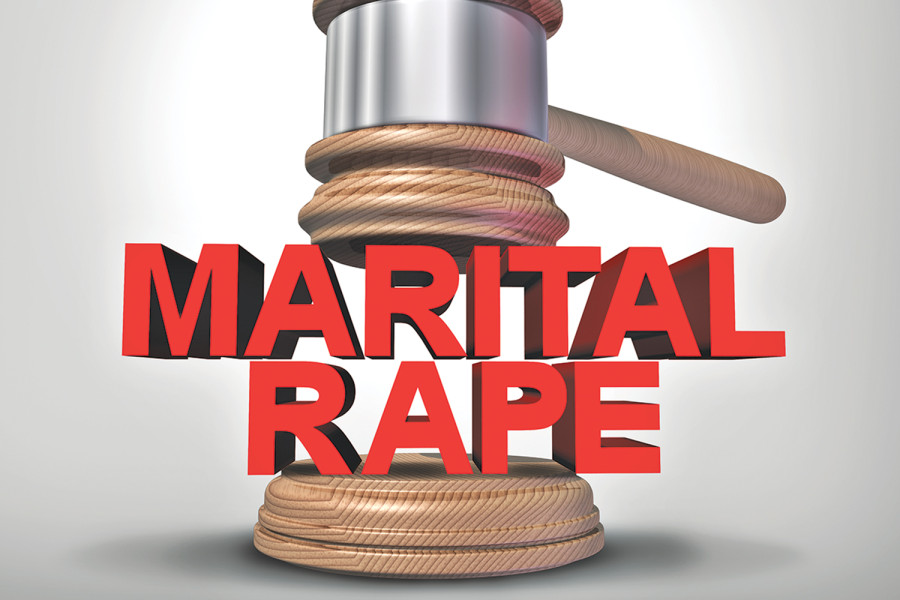National
Laws on marital rape still murky in Nepal
The separation of rape law and marital rape law, and other legal loopholes have denied victims of spousal rape real justice, rights activists say.
Manushree Mahat
On August 2, 2022, a 26-year-old woman from Baneshwar in Kathmandu filed an FIR against her husband for subjecting her to a series of sexual violence immediately after their marriage. The victim stated that the husband forced her into sexual acts repeatedly against her wish. The series started nine days after their wedding, the statement charged.
This was one of the 2,387 marital rape cases filed in Nepal that year. As of mid-March, 2023, the number of complaints stood at 1,567.
The issue made headlines earlier this month when Ravi Oad, winner of the second season of the reality TV show Nepal Idol, was accused of marital rape with a complaint filed against him at the Kanchanpur Area Police Office in Jhalari. A day before the case against Oad was filed, the Supreme Court had ordered the detention of judge Bhuwan Giri, who is accused of marital rape, revoking the High Court decision to release him on bail.
Marital rape law in Nepal has undergone several amendments, with jail terms and sentences extended over the years. “If the husband commits rape on his wife during the existence of marital relationship between them,” the Section 219 (4) of National Penal (Code) Act, 2017 states, “he shall be liable to a sentence of imprisonment for a term not exceeding five years.”
As opposed to previous laws regarding marital rape in the country—especially after the Supreme Court in 2006 declared marital rape a crime punishable by 3-6 months of jail term—the current law seems to acknowledge the severity of the crime. But increased jail term hasn’t ensured justice for the victims, experts say.
In Nepal and its neighbours, rape laws and marital rape laws are two separate codes. While the maximum jail term for rape in Nepal can exceed 10 years, the maximum sentence for marital rape is no more than five years.
Despite amendments to marital rape law in the country, there is a loophole in its implementation and that has been depriving victims of total and true justice, says Meera Dhungana, senior legal adviser at the Forum for Women, Law, and Development, an NGO working for women’s rights.
Dhungana blames vague wording of Section 219 of the Penal Code for leaving loopholes in the law’s implementation. According to Dhungana, due to the ‘up to 5 years’ provision of the code, the convict can face jail term anywhere from a few months to years, as the wording doesn’t set a mandatory term.
Nepal’s Supreme Court acknowledged the existence of marital rape in 2002 when it passed a judgment on a petition filed by the forum. Following a lengthy Public Interest Litigation (PIL), which demanded equality to victims of marital rape on the grounds that nonconsensual intercourse is rape even though it’s between spouses, the court acknowledged the existence of marital rape.
However, the judgement didn’t specify any punishment or jail term. It was only in 2006 that a jail term of 3 to 6 months was declared for those convicted of marital rape.
This wasn't enough. A jail term of mere months did little to prevent a second-time offence, Dhungana says. “Victims told us how their spouses had returned and begun their abuse once again,” she says.
After the Constitution of Nepal came into effect in 2015, the landmark Act to Amend Laws to End Gender Violence and Ensure Gender Equality increased the jail term for marital rape, from a minimum of 3 years up to 5 years.
However, the National Penal (Code) Act, 2017, changed things yet again as it left the minimum sentence for marital rape convicts unspecified. Now convicted could get away with a jail term of a few months.
“This is a glaring loophole,” Dhungana says. “It's very difficult for the convicted to get more than six months of jail term. The separation of rape and marital rape means those suffering violence from marital rape barely get justice, which shouldn’t be the case. Home is the place where you go to feel safe, and when violence occurs at home, the severity and mental and physical toll can be so much worse.”
The murky laws surrounding marital rape have their roots in social stigma. With the ‘reputation’ of families on the line, women who do file complaints are often compelled to back down.
“A lot of the victims end up withdrawing their statements and FIR due to familial pressure,” Dhungana says, adding that this often leads to out-of-court settlements.
Victims of marital rape face profound mental and psychological challenges after being abused at their own home, and the subsequent pressure to remain quiet about it. Research has shown marital rape to be associated with clinical depression and Post-Traumatic Stress Disorder (PTSD) and, in extreme cases, suicidality.
Despite the gravitas of the subsequent mental health problems, seeking psychological treatment for their trauma isn’t nearly as common among victims. Rupa Pradhan Chhetri, a trauma counsellor who has been treating victims of sexual assault for over 12 years now, says she has never encountered a victim seeking help for marital rape.
“I think a major reason for this is lack of awareness of marital rape itself, as well as societal pressure,” Chhetri says. “A large section of our society doesn’t acknowledge marital rape as an issue, which means most victims aren’t even aware of the assault they may have suffered. It’s no wonder then that seeking help isn’t common among the victims.”
Women’s rights activists say they have observed general lack of awareness among victims on several occasions. Sulochana Khanal, programme coordinator at Women’s Rehabilitation Centre (WOREC), says that during counselling sessions a large number of women seeking help for domestic violence often reveal details of spousal sexual abuse without realising it as such.
“We’ve handled cases and counselled survivors who specifically seek help for marital rape. But what’s also saddening is the number of women who do not realise the sexual violence and coercion they’ve been subjected to,” Khanal says. “We’d be counselling women on domestic abuse, and through these sessions, we hear stories that they have also been sexually exploited by their spouses.”
Advocate Sarita Pokhrel also states that many of the victims she has worked with have sought legal help only after years of spousal abuse.
“I think when it comes to marital rape, you rarely hear it occur as a one-time incident,” Pokhrel says. “It's often accompanied by years of spousal violence before the victims report it.”
Pokhrel also says that the victims she’s worked with rarely feel the sentences their spouses have been handed down to be enough. “Justice may be dealt with legally, but for the victims, it's not what they hoped for,” Pokhrel says.




 14.24°C Kathmandu
14.24°C Kathmandu















